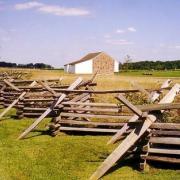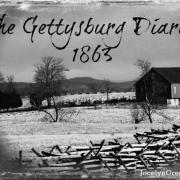Little Union Girl Touches the Heart of a Confederate at Gettysburg
During my research for Widow of Gettysburg, I read everything I could related to the battle of Gettysburg (July 1-3, 1863) and its aftermath. I read so many gory descriptions of the carnage that I started to glaze over them. But one day, a sweet letter from a soldier to a Sunday school girl brought tears to my eyes. I want to share it with you. First a little background: during the Civil War, the Christian Commission (born out of the YMCA) encouraged Sunday school classes in the North to put together "comfort bags" which were distributed by delegates of the Christian Commission to soldiers. These bags were small cloth kits which included thread, sewing needles, small scissors, and scraps of material. Each child also included a note with the bag to encourage the receiving soldier. At Gettysburg, a wounded Confederate received one of these comfort bags from a little girl in Massachusetts. He wrote back to her:
My Dear Little Friend--I received your present, the comfort bag, and it is thrice welcome, although it was intended for Union defenders. It was given to me by a Christian woman, who lost her holy anger against Rebels--for such am I--in her bounteous sympathy with the unfortunate. My little friend can imagine my thankfulness for the favor, when I inform her that I have no friends this side of heaven--all gone, father, mother, sister and brother, and I am all alone. The dear comfort-bag I shall always keep as a memento of true sympathy from a generous heart in the loyal State of Massachusetts. I hope you will not be disappointed by this, coming as it does from a Rebel; for I was forced into the ranks at the point of bayonet, for I would not go willingly to fight against the dear old flag, whose ample folds have always shielded the orphan and made glad the oppressed. I have read your note very many times over, and have wished it could rightfully be mine. "Do they think of me at home?" Silence--all is silence! Not so with the Union soldier; a thousand tokens tell him yes. I was wounded in the second day's fight and am now packing up my all to be exchanged or sent back a cripple for life. I am seventeen years old, and now am turned out with one arm to carve my way through the world; but my trust is in my heavenly Father, who will forgive and bless. Hoping that God may in mercy reunite us all again as brothers and sister. I am your unworthy friend. E--A--Co--. Miss. Volunteers
This touching letter appears in many documents and books, including Gettysburg and the Christian Commission by Daniel Hoisington. Following the battle of Gettysburg, the United States Christian Commission provided spiritual and physical care to thousands of wounded and dying soldiers of both armies. More than three hundred volunteers came to the battlefield, leaving a legacy of “a thousand little nameless acts.” The book includes important contemporary accounts of the battle’s aftermath, including the first complete publication of the diary of John Calhoun Chamberlain, one of the first delegates at Gettysburg and brother of the hero of Little Round Top. Jane Boswell Moore’s letters provide a glimpse of women’s work among the soldiers. Andrew Cross’ official report describes the carnage of battle as “a most fearful judgment of God upon a nation and people.” In a postwar story, George Peltz tells of a return to the Second Corps Hospital eight years later on a final mission of mercy. For more about the Heroines Behind the Lines Civil War novels, visit the Web site.


